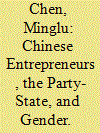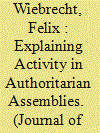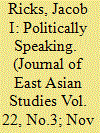|
|
|
Sort Order |
|
|
|
Items / Page
|
|
|
|
|
|
|
| Srl | Item |
| 1 |
ID:
189044


|
|
|
|
|
| Summary/Abstract |
In this article, we take a gender perspective to explore the relationship between private entrepreneurs’ business success and their Chinese Communist Party (CCP) membership. We theorize that, due to male-dominated CCP-business networks, female entrepreneurs are not able to leverage CCP membership into greater business success. Observable implications of this are that women will experience little or no business advantage from Party membership, while men will experience a significant advantage. The independence of women's business success from Party connections allows the possibility that women have carved out an area of autonomy from the party-state. Using a series of national entrepreneur surveys collected between 2002 and 2012, we assess the degree of empirical support for our expectations. We show that the CCP does appear to function as an exclusive “boys’ club” in terms of profitable patronage or networks, while the most successful women tend not to be Party members. The surveys also provide some evidence consistent with a CCP effort to recruit successful female entrepreneurs in order to curtail their autonomy. Our findings suggest non-CCP female entrepreneurs are a significant but generally overlooked socio-economic group with considerable potential autonomy.
|
|
|
|
|
|
|
|
|
|
|
|
|
|
|
|
| 2 |
ID:
189046


|
|
|
|
|
| Summary/Abstract |
Who attempts to influence policymaking through authoritarian assemblies and why are some delegates considerably more active in doing so than others? Drawing on original data from provincial People's Political Consultative Conferences (PPCCs) in China, this study adopts a delegate-centered perspective and develops a theory of delegates’ activity in authoritarian assemblies. It argues that delegates’ activity can be explained by a combination of both cooptation theory and an understanding of delegates’ position within the authoritarian regime and hierarchy. The results highlight that core elites with more direct means of influencing policymaking will forego assemblies. Yet, peripheral elites lack other institutional channels of access to decision-makers and have to voice their demands in authoritarian legislatures. This study highlights the need for disaggregating groups of actors in authoritarian politics and offers an alternative view of cooptation particularly relevant for closed authoritarian regimes.
|
|
|
|
|
|
|
|
|
|
|
|
|
|
|
|
| 3 |
ID:
189049


|
|
|
|
|
| Summary/Abstract |
The effects of the 1990s reforms to the electoral system of Japan's House of Representatives have been among the most frequently discussed topics in political science research on the country. These reforms saw the replacement of a hitherto single nontransferable vote (SNTV) system by a mixed-member majoritarian (MMM) system with a strong Single Member District (SMD) and a weaker Proportional Representation (PR) component. Many studies have suggested that the reforms may have had significant impact on the strategies of political parties. Generally, SMD systems have been widely thought to favor larger parties, while PR systems are more beneficial to small and medium-sized parties. On the content side, larger parties seeking control of the government would try to win the support of large numbers of floating voters by campaigning on universal/programmatic policy appeals, as opposed to particularistic interests. In contrast, smaller parties would cater towards their core supporters’ preferences. Previous studies have noted that the old SNTV system in Japan had produced results similar to PR systems (Reed 2003). Japan's electoral reform may have thus changed the strategy of large parties, which would need to win more seats in the SMDs to gain (or hold onto) power, while smaller parties have continued to try and win seats via the PR tier. Therefore, the reform provides valuable research material in so far as we can simultaneously observe different effects by the SMD and the PR systems on parties of different sizes.
|
|
|
|
|
|
|
|
|
|
|
|
|
|
|
|
| 4 |
ID:
189050


|
|
|
|
|
| Summary/Abstract |
The past few years have seen an emergence of populist leaders around the world, who have not only accrued but also maintained support despite rampant criticism, governance failures, and the ongoing COVID pandemic. The Philippines’ Rodrigo Duterte is the best illustration of this trend, with approval ratings rarely dipping below 80 percent. What explains his high levels of robust public support? We argue that Duterte is an ethnopopulist who uses ethnic appeals in combination with insider vs. outsider rhetoric to garner and maintain public support. Moreover, we argue that ethnic affiliation is a main driver of support for Duterte, and more important than alternative factors such as age, education, gender, or urban vs. rural divides. We provide evidence of Duterte's marriage of ethnic and populist appeals, then evaluate whether ethnicity predicts support for Duterte, using 15 rounds of nationally representative public opinion data. Identifying with a non-Tagalog ethnicity (like Duterte) leads to an 8 percent increase in approval for Duterte, significantly larger than any other explanatory factor. Among Duterte supporters, a non-Tagalog ethnicity is associated with 19 percent increase in strong versus mild support. Ethnicity is the only positive and significant result, suggesting that it strongly explains why Duterte's support remains robust. Alternative explanations, such as social desirability bias and alternative policy considerations, do not explain our results.
|
|
|
|
|
|
|
|
|
|
|
|
|
|
|
|
| 5 |
ID:
189047


|
|
|
|
|
| Summary/Abstract |
Language is one of the quintessential markers of ethnicity. It allows co-ethnics to easily identify one another and underscores in-group and out-group boundaries. Recognizing this, politicians frequently employ ethnic tongues to enhance their political appeal. To what extent does this shape the opinions of their audiences? Utilizing a survey experiment, I test the impact of an ethnic tongue against that of the common political language among the Javanese in Indonesia, the Tagalog in the Philippines, and the Isan people in Thailand. The experiment demonstrates that the ethnic language has a significant impact in both Thailand and Indonesia, but there appears to be little effect of using Tagalog over Filipino English in the Philippines. The findings suggest that ethnic tongues have the potential to significantly enhance political appeals, both among dominant (Javanese) and marginal (Isan) ethnic groups, but when the ethnic group is already the linguistic hegemon (Tagalog), such effects may be limited.
|
|
|
|
|
|
|
|
|
|
|
|
|
|
|
|
| 6 |
ID:
189048


|
|
|
|
|
| Summary/Abstract |
Under pressure to choose between the U.S. and China, Southeast Asian countries have adopted a hedging strategy: deepening economic relations with China while strengthening security cooperation with the U.S. How does the region's public view this strategy? With tensions rising in South China Sea territorial disputes, are more nationalistic individuals more likely to oppose hedging? Using an original public opinion survey conducted in the Philippines, we find that while an overwhelming majority of respondents were concerned about the territorial disputes, more nationalistic Filipinos were no more concerned than less nationalistic ones. Further, more nationalistic Filipinos were more likely to view economic relations with China as important for the Philippines and to approve of Duterte's China policy, which follows the logic of hedging. These surprising findings suggest that under the shadow of great-power competition, the link between domestic politics and foreign policy is nuanced in the Philippines, and Southeast Asia in general.
|
|
|
|
|
|
|
|
|
|
|
|
|
|
|
|
| 7 |
ID:
189045


|
|
|
|
|
| Summary/Abstract |
This article explains the political significance of the Union of Youth Federations of Cambodia, the quasi-youth wing of the ruling Cambodian People's Party in Cambodia. I argue that pro-regime events organized by the youth wing are a form of state mobilization designed to help the ruling party pre-empt the threat posed by the country's growing youth population. In doing so, the youth wing draws upon the monarchy, culture, and nationalism to regenerate the ruling party's legitimacy claims to make them more appealing to the target group. The article contributes to our knowledge of how authoritarian regimes mobilize citizens to maintain power.
|
|
|
|
|
|
|
|
|
|
|
|
|
|
|
|
| 8 |
ID:
189043


|
|
|
|
|
| Summary/Abstract |
Existing studies have relied on the notion of developmentalism to explain key aspects of the tax policies in Japan and Korea. However, limited efforts have been made to explore these cases from a comparative perspective based on relevant evidence. Far fewer studies have been conducted for examining the contemporary evolution of the tax policies following major reforms since the 1990s. This article seeks to fill these gaps in the research. Employing an analytic framework of tax structure, it provides key definitions of the old and new tax models in Japan and Korea in a way that is comparable with other OECD cases. “Residualism” and “constrained activism,” two heuristic models drawn from low-tax OECD countries, provide useful references for this comparative task. To validate key assessments, the author utilizes and replicates extensive tax data that operationalize important aspects of the tax structure from the 1980s to 2018.
|
|
|
|
|
|
|
|
|
|
|
|
|
|
|
|
| 9 |
ID:
189051


|
|
|
|
|
| Summary/Abstract |
Native allies are critical to the success of immigrants’ social movements in East Asian countries because of their relatively small number. However, it remains unclear whether advocacy messages from natives or from immigrants are more effective in changing natives’ attitudes toward supporting immigrant-oriented policies. We hypothesize, from the perspective of social identity theory, that the persuasiveness of a message varies, depending on the identity of the group sending the message—that is, whether it is an in-group or an out-group. To test this hypothesis, we conducted a survey experiment using the case of granting local voting rights to immigrants in Japan. We found that support for granting local voting rights to immigrants does not decrease when the Japanese hear advocacy messages from the Japanese, however, it does decrease when they hear messages from Korean immigrants who stand to benefit from the granting of local suffrage. These results suggest that natives’ advocacy messages may increase support for immigrants.
|
|
|
|
|
|
|
|
|
|
|
|
|
|
|
|
| 10 |
ID:
189052


|
|
|
|
|
|
|
|